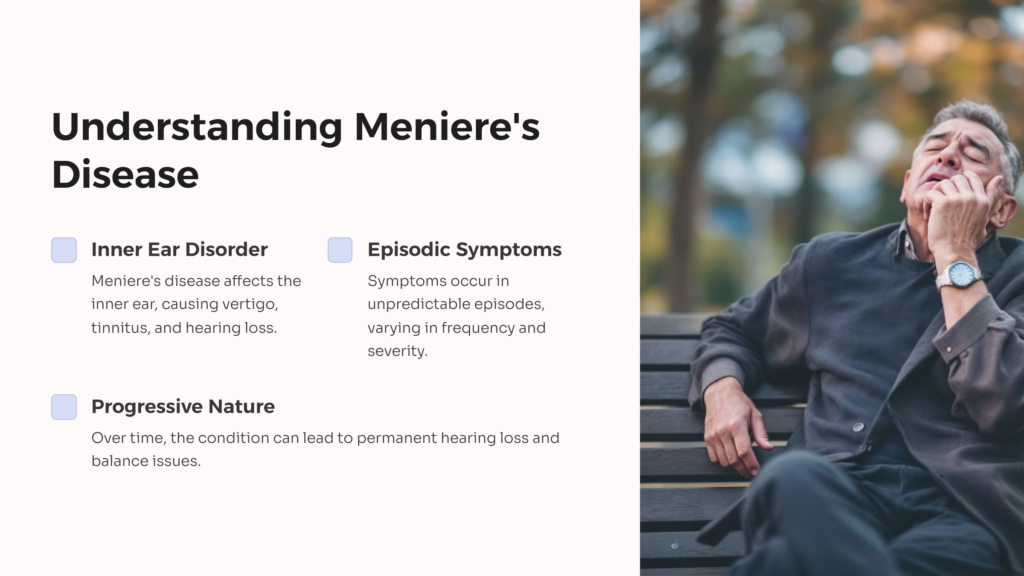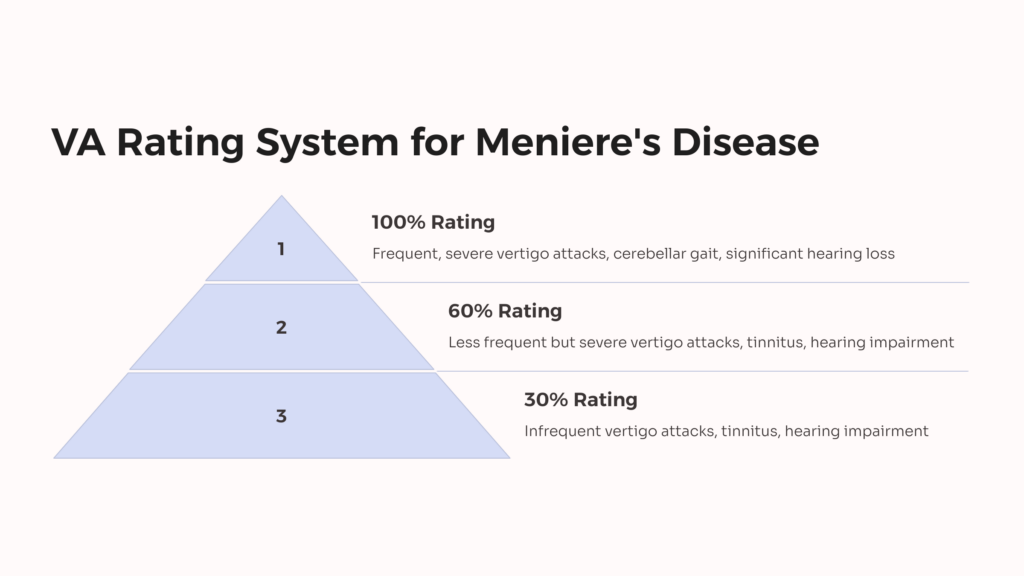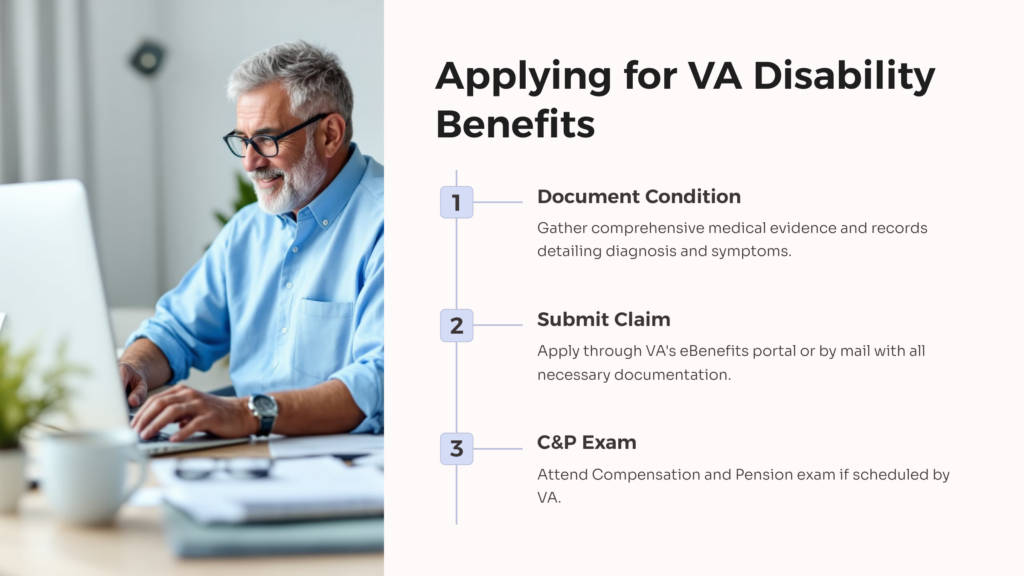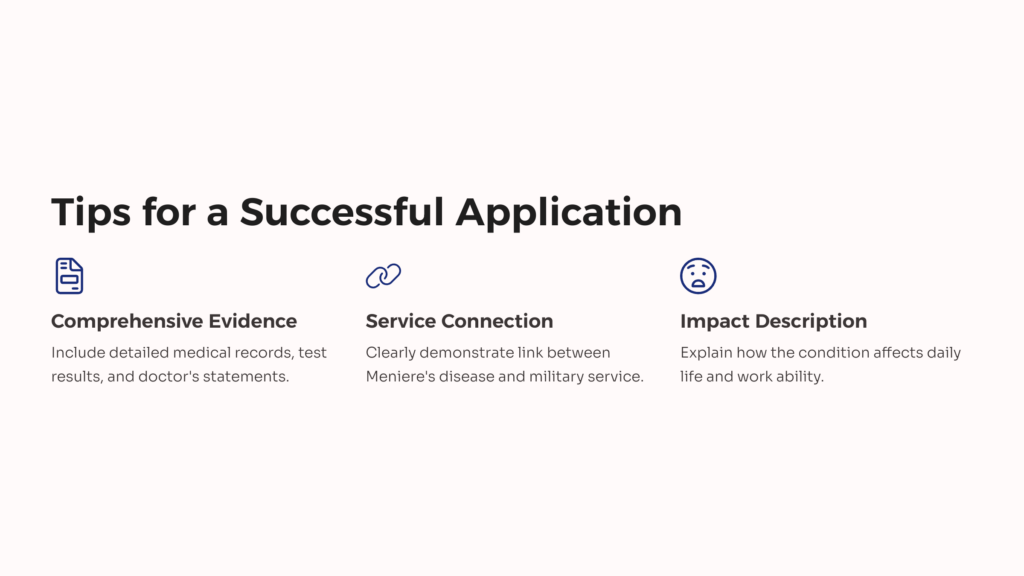Meniere’s disease is a chronic condition that affects the inner ear, leading to episodes of vertigo, tinnitus, hearing loss, and a feeling of fullness or pressure in the ear. These symptoms can be debilitating and significantly impact an individual’s quality of life. For veterans, who may already face a range of health issues due to their service, Meniere’s disease can pose an additional challenge.
The Department of Veterans Affairs (VA) provides disability ratings to veterans suffering from service-connected conditions, offering them compensation and benefits proportional to the severity of their disability. Understanding how Meniere’s disease is evaluated and rated by the VA is crucial for veterans seeking the benefits they are entitled to.
Understanding Meniere’s Disease

What is Meniere’s Disease?
Meniere’s disease is a disorder of the inner ear that can cause vertigo, tinnitus (ringing in the ears), hearing loss, and aural fullness. The exact cause of Meniere’s disease is unknown, but it is believed to be related to abnormal fluid buildup in the inner ear.
Common Symptoms and The Typical Progression of Meniere’s Disease
The symptoms of Meniere’s disease often occur in episodes and can vary in frequency and severity. Common symptoms include:
- Vertigo: A spinning sensation that can last from a few minutes to several hours.
- Tinnitus: Persistent ringing, buzzing, or hissing in the ears.
- Hearing loss: This can fluctuate, particularly early in the disease, but over time it often becomes permanent.
- Aural fullness: A feeling of pressure or fullness in the ear.
The progression of Meniere’s disease can be unpredictable. Some individuals may experience periods of remission, while others may have frequent and severe episodes. Over time, the condition can lead to significant hearing loss and persistent balance issues.
Who Gets Meniere’s Disease and Why?
Meniere’s disease can affect individuals of any age, but it is most commonly diagnosed in adults between the ages of 40 and 60. While the exact cause is unknown, factors such as genetics, autoimmune disorders, allergies, and viral infections are believed to contribute to its development.
Meniere’s Disease and Its Impact on Veterans
Frequency of Meniere’s Disease in Veterans
Veterans may have a higher prevalence of Meniere’s disease compared to the general population. This increased frequency is likely due to the various environmental and occupational hazards they are exposed to during their service.
The Effects on Vets’ Quality of Life
Meniere’s disease can significantly impact a veteran’s quality of life. The unpredictable nature of vertigo attacks can make it difficult to perform daily activities, maintain employment, and enjoy social interactions. The constant ringing in the ears and hearing loss can also lead to communication challenges and emotional distress.
Why Veterans Are At a Higher Risk of Developing Meniere’s Disease
Veterans may be more prone to developing Meniere’s disease due to exposure to loud noises, head trauma, and stress during their service. These factors can contribute to inner ear damage and increase the risk of developing the condition.
Military personnel experience unique environmental and occupational hazards during their service, which can increase their susceptibility to Meniere’s disease. These hazards include:
Exposure to Loud Noises: Veterans, especially those in combat roles or those who work in environments with heavy machinery or aircraft, are frequently exposed to loud noises. This prolonged exposure can lead to noise-induced hearing loss and inner ear damage, both of which are risk factors for developing Meniere’s disease. The constant exposure to high decibel levels can damage the delicate structures within the inner ear, contributing to the onset of Meniere’s disease.
Head Trauma: Veterans are at a higher risk of head injuries due to the nature of their duties, which often involve physical combat, accidents, or exposure to blasts. Traumatic brain injuries (TBI) and other head traumas can lead to damage in the inner ear or disrupt the normal function of the auditory and vestibular systems. This damage can result in the symptoms characteristic of Meniere’s disease.
Chronic Stress and Anxiety: The stress and anxiety associated with military service, particularly for those who have seen combat or experienced traumatic events, can have wide-ranging effects on physical health. Chronic stress is known to affect various bodily systems, including the auditory and vestibular systems. Stress can exacerbate symptoms of Meniere’s disease and may even contribute to its onset by affecting the balance of fluids in the inner ear.
Chemical Exposures: Veterans may be exposed to ototoxic chemicals (substances that can damage the ear) during their service, including solvents, heavy metals, and other hazardous materials. These chemicals can damage the inner ear structures or disrupt the balance of ear fluids, potentially leading to Meniere’s disease.
Viral Infections: Veterans deployed in various parts of the world may be exposed to different viral infections, which can sometimes affect the inner ear and contribute to the development of Meniere’s disease. Viruses that cause inflammation or damage to the inner ear structures can lead to the characteristic symptoms of the disease.
Given these risk factors, it’s not surprising that Meniere’s disease may be more common among veterans. The combination of physical trauma, environmental hazards, and psychological stress creates a perfect storm of risk factors that can contribute to the development of this chronic condition. The effects of Meniere’s disease on veterans’ quality of life can be profound, impacting their ability to work, socialize, and carry out daily activities.
Moreover, the nature of military service can sometimes delay the diagnosis and treatment of Meniere’s disease. Veterans may not immediately recognize the symptoms or may attribute them to other causes, delaying their access to appropriate medical care. The stigma associated with seeking help for medical or psychological issues can also be a barrier, preventing veterans from getting the support they need.
The frequency and impact of Meniere’s disease among veterans highlight the importance of targeted healthcare and support services for this population. Understanding the unique risk factors and challenges faced by veterans can help in developing better diagnostic, treatment, and support strategies, ensuring that those affected by Meniere’s disease receive the care and compensation they deserve.
How VA Rates Meniere’s Disease
What is the VA Rating System?
The VA Disability Rating System is a framework used by the U.S. Department of Veterans Affairs (VA) to evaluate and compensate veterans for disabilities resulting from their military service. This system assigns a percentage rating to a veteran’s service-connected condition, reflecting the severity of the disability and its impact on the veteran’s ability to function and work. Here’s a detailed explanation of the VA rating system:
The primary purpose of the VA rating system is to provide financial compensation to veterans who suffer from disabilities due to their military service. The compensation aims to offset the impact of these disabilities on the veteran’s quality of life and earning capacity.

The VA rating system evaluates the severity of a veteran’s disability by assigning a percentage rating. These ratings range from 0% to 100% in increments of 10%. The higher the percentage, the more severe the disability and the greater the VA disability benefits provided.
The VA uses the VA Schedule for Rating Disabilities (VASRD), which is a comprehensive guide that lists various medical conditions and the criteria for rating each one. The VASRD considers several factors, including:
- Symptoms: The specific symptoms associated with the condition.
- Severity: How severe and debilitating the symptoms are.
- Impact on Daily Life: The extent to which the disability affects the veteran’s ability to perform daily activities and work.
- Medical Evidence: Documentation and medical evidence, such as doctor’s reports, diagnostic test results, and treatment records.
Criteria Used By The VA to Rate Meniere’s Disease
The VA rates Meniere’s disease under Diagnostic Code 6205. The rating criteria consider the frequency and severity of vertigo attacks, hearing impairment, and the presence of tinnitus. Specifically, the ratings are as follows:
- 100%: If there are frequent and severe vertigo attacks, cerebellar gait (difficulty walking due to unsteadiness), and significant hearing loss.
- 60%: If there are less frequent but severe vertigo attacks, with tinnitus and hearing impairment.
- 30%: If vertigo attacks are infrequent, with tinnitus and hearing impairment.
Typical VA Ratings for Meniere’s Disease
Most veterans with Meniere’s disease receive ratings of 30% or 60%, depending on the frequency and severity of their symptoms. A 100% rating is rare and usually reserved for those with severe and debilitating symptoms that significantly impact daily functioning.
How To Apply for Disability Benefits for Meniere’s Disease

Documenting the Condition and Its Impact
To apply for a VA disability rating and hopefully receive VA compensation for Meniere’s disease, veterans need to provide thorough documentation of their condition. This includes medical records, test results, and statements from healthcare providers detailing the diagnosis, symptoms, and impact on daily life.
The VA’s Application Process
The application process involves submitting a claim through the VA’s eBenefits portal or by mail. Veterans will need to provide evidence of their condition, service connection, and the impact on their ability to work and perform daily activities. The VA may also schedule a Compensation and Pension (C&P) exam to evaluate the severity of the condition.
Tips for a Successful Application

Gather comprehensive medical evidence: Include detailed medical records, test results, and doctor’s statements.
Clearly demonstrate the service connection: Provide evidence linking Meniere’s disease to military service, such as exposure to loud noises or head trauma.
Describe the impact on daily life: Explain how the condition affects your ability to work, perform daily activities, and enjoy life.
Seek assistance: Consider working with a Veterans Service Officer (VSO) or a VA-accredited representative to ensure your application is complete and accurate.
What to Do if Your VA Rating Is Denied or Lower Than Expected
Review the Reasons for the Denial or Low Rating
If your VA rating is denied or lower than expected, carefully review the VA’s decision letter to understand the reasons for the decision. This will help you identify any gaps in the evidence or areas that need further clarification.
Gathering Additional Medical Evidence
If the denial or low rating is due to insufficient medical evidence, gather additional documentation to support your claim. This may include obtaining a second opinion from a specialist, undergoing further testing, or providing updated medical records.
Steps to Appealing a VA Rating Decision
To appeal a VA rating decision, you can file a Notice of Disagreement (NOD) with the VA. This begins the appeals process, which may involve a review by a Decision Review Officer (DRO) or a hearing before the Board of Veterans’ Appeals. Providing additional evidence and working with a VSO or VA-accredited representative can improve your chances of a successful appeal.
Final Thoughts
Meniere’s disease is a challenging condition that can significantly impact veterans’ lives. Understanding the VA rating process for Meniere’s disease is essential for veterans seeking compensation and benefits for their service-connected condition. By thoroughly documenting the condition, following the VA’s application process, and knowing how to appeal a decision, veterans can ensure they receive the benefits they deserve. Awareness and knowledge of VA ratings for Meniere’s disease can empower veterans to navigate the system effectively and secure the support they need.
We’re here to help at AllVeteran.com. Take our free medical evidence screening quiz to find out where to get started today.
 AllVeteran.com Advisors
AllVeteran.com Advisors
With expertise spanning local, state, and federal benefit programs, our team is dedicated to guiding individuals towards the perfect program tailored to their unique circumstances.











